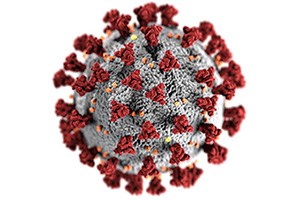- Apply
- Visit
- Request Info
- Give



Published on May 05, 2020

The novel coronavirus SARS-CoV-2 causes the respiratory illness COVID-19.
Answering a call for teaching tools related to the coronavirus pandemic, Biology Professor Amy Groth has authored a new case study called “Fatally Flawed? Early Genetic Testing for the COVID-19 Virus.” The study was published by the National Center for Case Study Teaching in Science (NCCSTS).
The respiratory illness COVID-19, which is caused by the novel coronavirus SARS-CoV-2, was first detected in China in late 2019 and has since rapidly spread throughout the globe. Groth writes in the study’s abstract, “Efforts to slow the spread of the virus in the United States were hampered by a lack of testing in part due to defects in the initial test kits sent to labs across the country from the Centers for Disease Control and Prevention.”
 In this two-part case study meant for upper-level biology classes, students explore the types of viruses and genetic tests to detect them. Students then compare the SARS and COVID-19 genome sequences, identify the regions (of the viral RNA genome) that the initial tests detected, and look at the rate of mutation in sequenced viruses from patient clinical samples.
In this two-part case study meant for upper-level biology classes, students explore the types of viruses and genetic tests to detect them. Students then compare the SARS and COVID-19 genome sequences, identify the regions (of the viral RNA genome) that the initial tests detected, and look at the rate of mutation in sequenced viruses from patient clinical samples.
There are more than 800 peer-reviewed cases in the NCCSTS database, which is a program of the University at Buffalo. The database is open to the public and new cases are shared with some 20,000 educators, according to Groth.
“I only had a couple of weeks to write (the case study),” she said, as the NCCSTS is fast-tracking the publication of COVID-19 cases this semester. “It’s essentially a teaching tool. I also designed an online laboratory portion using publicly available databases to help people who were scrambling to come up with online labs for biology courses.”
To produce the case study, Groth used a variety of sources, including current articles from publications like the New York Times and Washington Post, scientific journal articles, information from the Centers for Disease Control and Prevention, and data available in genomic databases.
The project was part of Groth’s “adaptation to quarantining.” She’s been on sabbatical with the intention of continuing her research on the microscopic worm C. elegans, which has genes related to human development and cancer. Laboratory time was cut short in March, however, “so I saw this opportunity to use the current event of COVID-19 and the situation of my quarantine to help other educators that were forced online and looking for teaching materials, particularly labs for molecular courses,” said Groth.
Because of the study’s online format, Groth may use the case in her coming genetics or biotechnology courses.
Written by Michael Rouleau